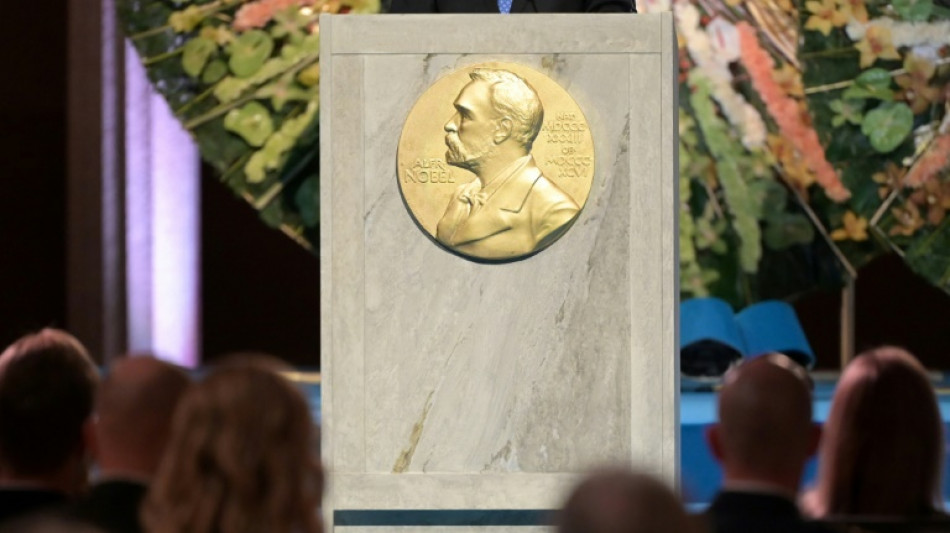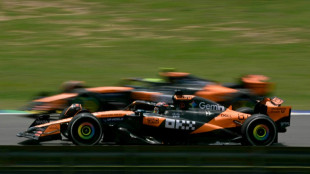
-
 Deadly storm sparks floods in Spain, disrupts Portugal vote
Deadly storm sparks floods in Spain, disrupts Portugal vote
-
Ukrainian flag bearer proud to show his country is still standing

-
 Carney scraps Canada EV sales mandate
Carney scraps Canada EV sales mandate
-
Morocco says evacuated 140,000 people due to severe weather

-
 Spurs boss Frank says Romero outburst 'dealt with internally'
Spurs boss Frank says Romero outburst 'dealt with internally'
-
Giannis suitors make deals as NBA trade deadline nears

-
 Carrick stresses significance of Munich air disaster to Man Utd history
Carrick stresses significance of Munich air disaster to Man Utd history
-
Record January window for transfers despite drop in spending

-
 'Burned inside their houses': Nigerians recount horror of massacre
'Burned inside their houses': Nigerians recount horror of massacre
-
Iran, US prepare for Oman talks after deadly protest crackdown

-
 Winter Olympics opening ceremony nears as virus disrupts ice hockey
Winter Olympics opening ceremony nears as virus disrupts ice hockey
-
Mining giant Rio Tinto abandons Glencore merger bid

-
 Davos forum opens probe into CEO Brende's Epstein links
Davos forum opens probe into CEO Brende's Epstein links
-
ECB warns of stronger euro impact, holds rates

-
 Famine spreading in Sudan's Darfur, warn UN-backed experts
Famine spreading in Sudan's Darfur, warn UN-backed experts
-
Lights back on in eastern Cuba after widespread blackout

-
 Russia, US agree to resume military contacts at Ukraine talks
Russia, US agree to resume military contacts at Ukraine talks
-
Greece aims to cut queues at ancient sites with new portal

-
 No time frame to get Palmer in 'perfect' shape - Rosenior
No time frame to get Palmer in 'perfect' shape - Rosenior
-
Stocks fall as tech valuation fears stoke volatility

-
 US Olympic body backs LA28 leadership amid Wasserman scandal
US Olympic body backs LA28 leadership amid Wasserman scandal
-
Gnabry extends Bayern Munich deal until 2028

-
 England captain Stokes suffers facial injury after being hit by ball
England captain Stokes suffers facial injury after being hit by ball
-
Italy captain Lamaro amongst trio set for 50th caps against Scotland

-
 Piastri plays down McLaren rivalry with champion Norris
Piastri plays down McLaren rivalry with champion Norris
-
ECB holds interest rates as strong euro causes jitters

-
 Spain, Portugal face floods and chaos after deadly new storm
Spain, Portugal face floods and chaos after deadly new storm
-
EU close to sealing trade deal with Australia

-
 German Cup final to stay in Berlin until 2030
German Cup final to stay in Berlin until 2030
-
What does Iran want from talks with the US?

-
 Taming the lion: Olympians take on Bormio's terrifying Stelvio piste
Taming the lion: Olympians take on Bormio's terrifying Stelvio piste
-
Wind turbine maker Vestas sees record revenue in 2025

-
 Italy's Casse tops second Olympic downhill training
Italy's Casse tops second Olympic downhill training
-
Anti-doping boss 'uncomfortable' with Valieva's coach at Olympics

-
 Bitcoin under $70,000 for first time since Trump's election
Bitcoin under $70,000 for first time since Trump's election
-
'I am sorry,' embattled UK PM tells Epstein victims

-
 England's Brook predicts record 300-plus scores at T20 World Cup
England's Brook predicts record 300-plus scores at T20 World Cup
-
Ukraine, Russia swap prisoners, US says 'work remains' to end war

-
 Wales' Rees-Zammit at full-back for Six Nations return against England
Wales' Rees-Zammit at full-back for Six Nations return against England
-
Sad horses and Draco Malfoy: China's unexpected Lunar New Year trends

-
 Hong Kong students dissolve pro-democracy group under 'severe' pressure
Hong Kong students dissolve pro-democracy group under 'severe' pressure
-
Germany claws back 59 mn euros from Amazon over price controls

-
 Germany claws back 70 mn euros from Amazon over price controls
Germany claws back 70 mn euros from Amazon over price controls
-
VW and Stellantis urge help to keep carmaking in Europe

-
 Stock markets drop amid tech concerns before rate calls
Stock markets drop amid tech concerns before rate calls
-
BBVA posts record profit after failed Sabadell takeover

-
 UN human rights agency in 'survival mode': chief
UN human rights agency in 'survival mode': chief
-
Greenpeace slams fossil fuel sponsors for Winter Olympics

-
 Greenpeace slams fossel fuel sponsors for Winter Olympics
Greenpeace slams fossel fuel sponsors for Winter Olympics
-
Kinghorn, Van der Merwe dropped by Scotland for Six Nations opener

| CMSC | -0.17% | 23.48 | $ | |
| SCS | 0.12% | 16.14 | $ | |
| NGG | -0.71% | 87.17 | $ | |
| RBGPF | 0.12% | 82.5 | $ | |
| RYCEF | -0.36% | 16.62 | $ | |
| RIO | -4.49% | 92.335 | $ | |
| CMSD | 0.21% | 23.92 | $ | |
| GSK | 3.44% | 59.27 | $ | |
| BTI | 0.61% | 62.01 | $ | |
| BCE | -4.2% | 25.279 | $ | |
| RELX | 0.73% | 30 | $ | |
| BCC | -2.52% | 88.01 | $ | |
| VOD | -6.98% | 14.685 | $ | |
| AZN | 0.78% | 188.92 | $ | |
| BP | -2.42% | 38.275 | $ | |
| JRI | 0.3% | 13.19 | $ |

Narcolepsy, cancer tipped as Medicine Prize opens Nobel week
Narcolepsy, cancer or mRNA vaccine research could win the Nobel Medicine Prize on Monday when a week of announcements kick off, but experts see no clear frontrunner for the Peace Prize.
The awards, first handed out in 1901, were created by Swedish inventor and philanthropist Alfred Nobel in his 1895 will to celebrate those who have "conferred the greatest benefit on mankind."
The Medicine Prize is first out, and will be announced in Stockholm on Monday around 11:30 am (0930 GMT), followed by the awards for physics on Tuesday, chemistry on Wednesday and literature on Thursday.
The Peace Prize, the most highly-anticipated Nobel and the only one announced in Oslo, will follow on Friday, before the Economics Prize rounds things off on October 9.
The Medicine Prize has over the years crowned groundbreaking discoveries like the X-ray, penicillin, insulin and DNA -- as well as now-disgraced awards for the lobotomy and the insecticide DDT.
Several Nobel watchers have suggested this year's prize could go to research into narcolepsy and the discovery of orexin, a neuropeptide that helps regulate sleep.
It could also go to Hungarian-born Katalin Kariko and Drew Weissman of the United States for research that led directly to the first mRNA vaccines to fight Covid-19, made by Pfizer and Moderna.
Their discovery has already won a slew of major medicine prizes, but the Nobel committee nowadays often waits decades to bestow its laurels to ensure the research stands the test of time.
"Maybe the Academy thinks it needs to look into it more, but someday they should win," predicted Annika Ostman, science reporter at Swedish public radio SR.
- Gene engineering and IceCube telescope -
But Ostman said her guess for this year was on Kevan Shokat, an American biologist who figured out how to block the KRAS cancer gene behind a third of cancers, including challenging-to-treat lung, colon, and pancreatic tumours.
T-cell therapy for cancer treatment and work on the human microbiome could also be contenders, said David Pendlebury, head of the Clarivate analytics group which identifies Nobel-worthy research.
"There are more people deserving of a Nobel Prize than there are Nobels to go around," he told AFP.
Lars Brostrom, Ostman's colleague at SR, singled out two American biologists, Stanislas Leibler and Michael Elowitz, for their work on synthetic gene circuits which established the field of synthetic biology.
It enables scientists to redesign organisms by engineering them to have new abilities.
But Brostrom noted the field could be seen as controversial, raising "ethical questions about where to draw the line in creating life".
For the Physics Prize, twisted graphene or the IceCube Neutrino Observatory in Antarctica were seen as possible winners, as well as the development of high-density data storage in the field of spintronics.
- Peace Prize to Iranian women? -
For Wednesday's Chemistry Prize, Pendlebury suggested next-generation DNA sequencing could get the nod, or research into how to target and deliver drugs to genes.
Brostrom said he would love to see it go to US-based chemist Omar Yaghi for his work into porous materials known as MOFs, which can absorb poisonous gases or harvest water from desert air, and is an "important field for the future" with enormous potential for the environment.
Criticism over a lack of gender and geographical diversity has plagued the Nobels over the years.
US-based men have dominated the science fields, while women account for just six percent of overall laureates -- something the various award committees insist they are addressing.
Among the names making the rounds for Thursday's Literature Prize are Russian author and outspoken Putin critic Lyudmila Ulitskaya, Chinese avant-garde writer Can Xue, British author Salman Rushdie, Caribbean-American writer Jamaica Kincaid and Norwegian playwright Jon Fosse.
But for the Peace Prize, experts have been scratching their heads over possible winners, as conflicts rage around the globe.
Some have pointed to the Iranian women protesting since the death in custody a year ago of Mahsa Amini, arrested for violating Iran's strict dress code imposed on women.
Others suggest organisations documenting war crimes in Ukraine, or the International Criminal Court, which could one day be called upon to judge them.
"I think that climate change is a really good focus for the Peace Prize this year," Dan Smith, the head of the Stockholm International Peace Research Institute, told AFP after a year of extreme weather around the world.
For the Economics Prize, research on income and wealth inequality could be honoured.
F.AbuZaid--SF-PST




